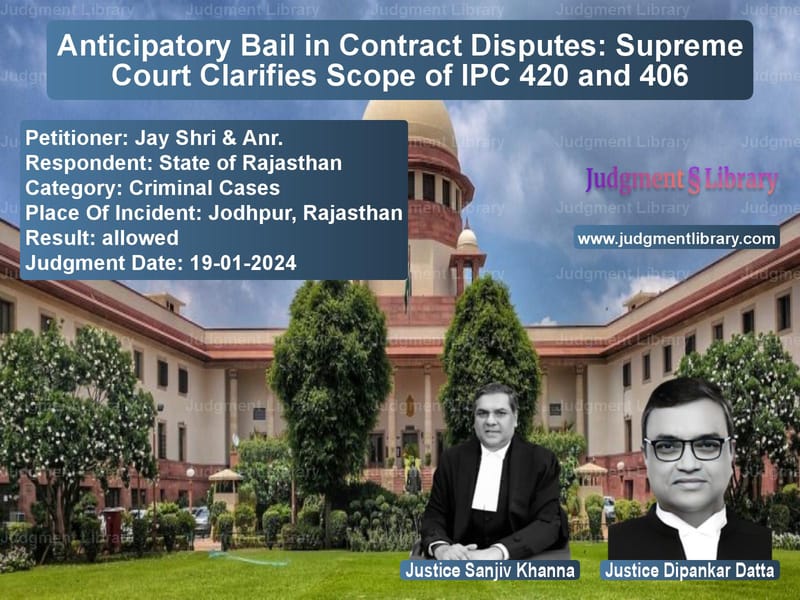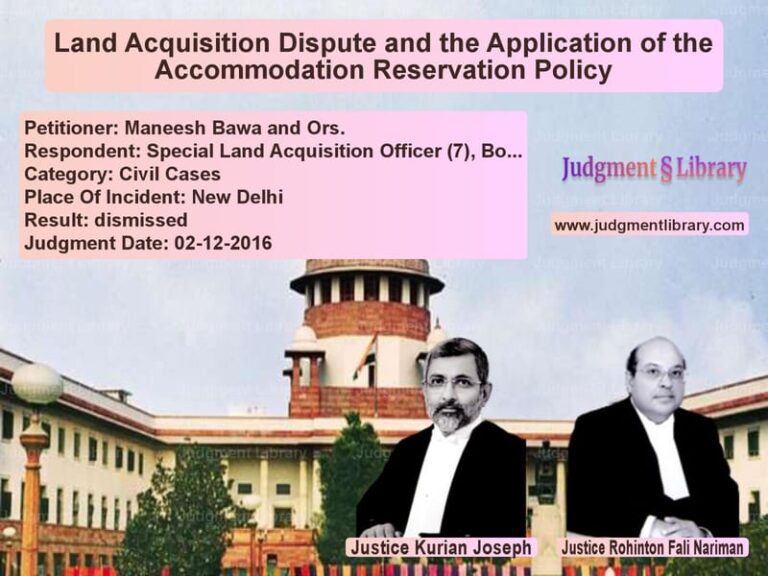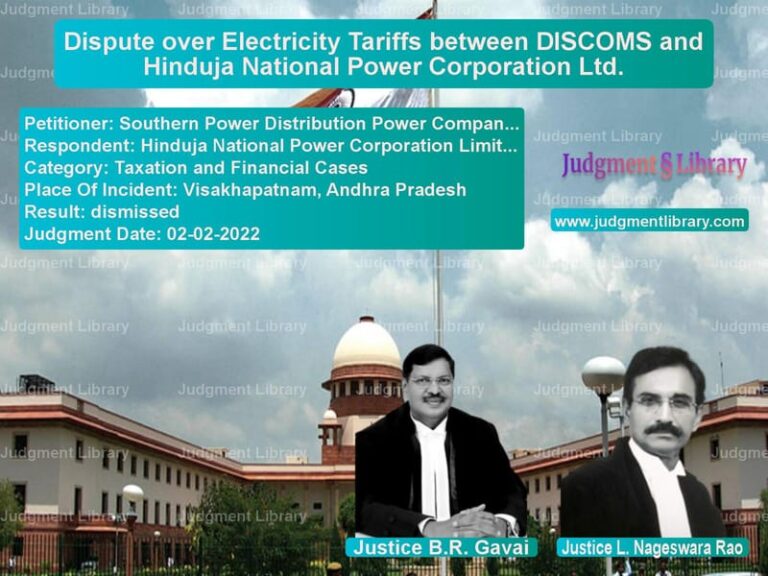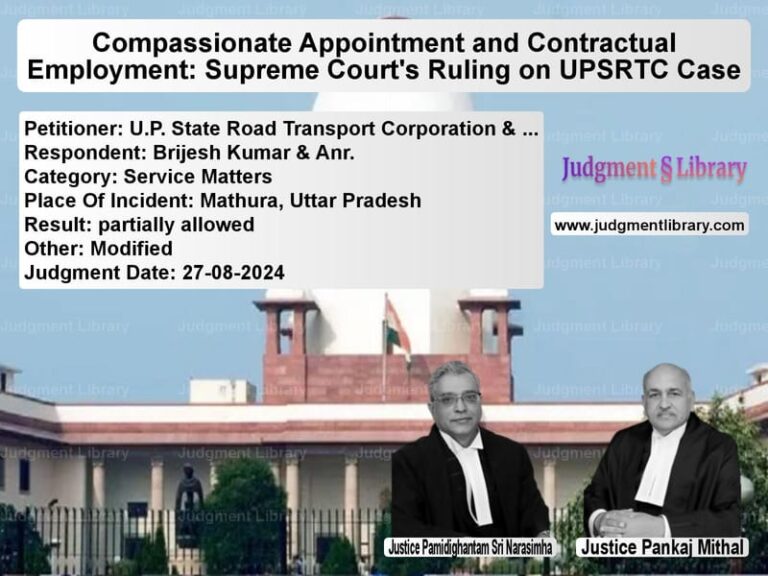Anticipatory Bail in Contract Disputes: Supreme Court Clarifies Scope of IPC 420 and 406
The Supreme Court of India, in its judgment dated 19 January 2024, addressed the crucial question of whether a breach of contract constitutes a criminal offense under Section 420 (cheating) and Section 406 (criminal breach of trust) of the Indian Penal Code (IPC). The case, Jay Shri & Anr. vs. State of Rajasthan, emphasized that criminal prosecution should not be used as a tool to settle civil disputes. The Court granted anticipatory bail to the appellants, reaffirming that a criminal case cannot be made out unless fraudulent or dishonest intent is present from the outset of the transaction.
Background of the Case
The case arose from an FIR registered on 26 August 2022 at Osiyan Police Station, Jodhpur Rural, Rajasthan. The appellants, Jay Shri and Hitesh Kela, were accused under:
- Section 420 IPC (cheating).
- Section 120B IPC (criminal conspiracy).
The complainant alleged that the appellants had engaged in fraud by failing to fulfill a contract. However, the appellants contended that the dispute was purely civil and should not have been converted into a criminal case.
After being denied relief by lower courts, the appellants approached the Supreme Court seeking anticipatory bail.
Legal Provisions in Question
Before analyzing the arguments, it is essential to understand the provisions under which the appellants were charged:
- Section 420 IPC: This section deals with cheating and dishonestly inducing the delivery of property. It applies when a person deceives another to deliver property or alters its value through fraudulent means.
- Section 406 IPC: This provision deals with criminal breach of trust. If a person entrusted with property dishonestly misappropriates it, they may be held liable under this section.
- Section 120B IPC: This pertains to criminal conspiracy, where two or more individuals agree to commit an illegal act.
Petitioner’s Arguments (Jay Shri and Hitesh Kela)
The appellants, represented by their counsel, made the following arguments:
- No fraudulent intent at inception: The alleged non-fulfillment of contractual obligations does not establish that they had any intention to cheat at the beginning of the transaction.
- Criminal law should not be misused: The Supreme Court has repeatedly cautioned against using criminal cases to pressure parties into settling civil disputes.
- No misappropriation of property: The case did not involve wrongful taking of property or dishonest inducement.
- Harassment through criminal prosecution: The complainant used the criminal justice system to exert undue pressure on the appellants.
Respondent’s Arguments (State of Rajasthan)
The State opposed the bail plea, contending:
- The complainant suffered a financial loss due to the appellants’ actions.
- The FIR disclosed elements of cheating and conspiracy.
- Investigation was necessary to determine the extent of wrongdoing.
Supreme Court’s Judgment
The Supreme Court, comprising Justice Sanjiv Khanna and Justice Dipankar Datta, ruled in favor of the appellants, granting them anticipatory bail. The Court’s key observations included:
- Contractual breach does not constitute cheating: The Court reiterated that a mere breach of contract cannot be classified as cheating unless fraudulent intent exists from the beginning.
- Distinction between civil and criminal law: Criminal law cannot be used to settle private disputes where no criminal intent is proven.
- Fraudulent intent must be proven: The complainant failed to establish that the appellants had a dishonest motive at the time of entering into the contract.
- Precedents supporting the ruling: The Court cited several past cases where it had ruled that civil disputes should not be converted into criminal cases.
The Court directed that:
- The appellants should be released on bail if arrested.
- The bail would be subject to conditions under Section 438(2) CrPC.
- The ruling would not impact any ongoing civil litigation.
Precedents Cited by the Supreme Court
- Sarabjit Kaur vs. State of Punjab (2023) 5 SCC 360: A contractual dispute cannot be treated as cheating unless deception is established.
- Indian Oil Corporation vs. NEPC India Ltd. (2006) 6 SCC 736: Civil disputes should not be converted into criminal cases for coercion.
- Vijay Kumar Ghai vs. State of West Bengal (2022) 7 SCC 124: Criminal law should not be used to settle private disputes.
Impact of the Judgment
This ruling has significant implications:
- Prevents misuse of criminal law: The judgment ensures that businesses and individuals are not harassed through false criminal cases.
- Protects contractual agreements: Civil disputes must be handled within the framework of civil law.
- Reaffirms due process: Criminal proceedings should not be initiated without strong evidence of fraudulent intent.
Conclusion
The Supreme Court’s decision in Jay Shri & Anr. vs. State of Rajasthan reaffirms that criminal law should not be used to settle business disputes. By granting anticipatory bail, the Court ensured that individuals are not subjected to unnecessary criminal proceedings for contractual disagreements. This judgment serves as an important precedent for protecting the integrity of the legal system and preventing harassment through misuse of criminal laws.
Petitioner Name: Jay Shri & Anr..Respondent Name: State of Rajasthan.Judgment By: Justice Sanjiv Khanna, Justice Dipankar Datta.Place Of Incident: Jodhpur, Rajasthan.Judgment Date: 19-01-2024.
Don’t miss out on the full details! Download the complete judgment in PDF format below and gain valuable insights instantly!
Download Judgment: jay-shri-&-anr.-vs-state-of-rajasthan-supreme-court-of-india-judgment-dated-19-01-2024.pdf
Directly Download Judgment: Directly download this Judgment
See all petitions in Bail and Anticipatory Bail
See all petitions in Fraud and Forgery
See all petitions in Legal Malpractice
See all petitions in Contract Disputes
See all petitions in Public Sector Employees
See all petitions in Judgment by Sanjiv Khanna
See all petitions in Judgment by Dipankar Datta
See all petitions in allowed
See all petitions in supreme court of India judgments January 2024
See all petitions in 2024 judgments
See all posts in Criminal Cases Category
See all allowed petitions in Criminal Cases Category
See all Dismissed petitions in Criminal Cases Category
See all partially allowed petitions in Criminal Cases Category







